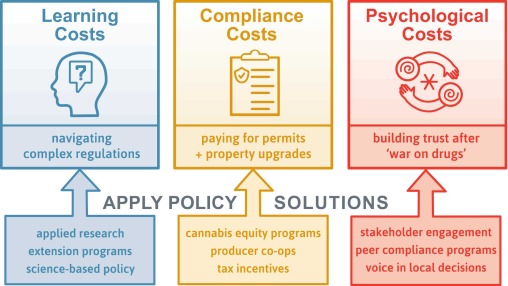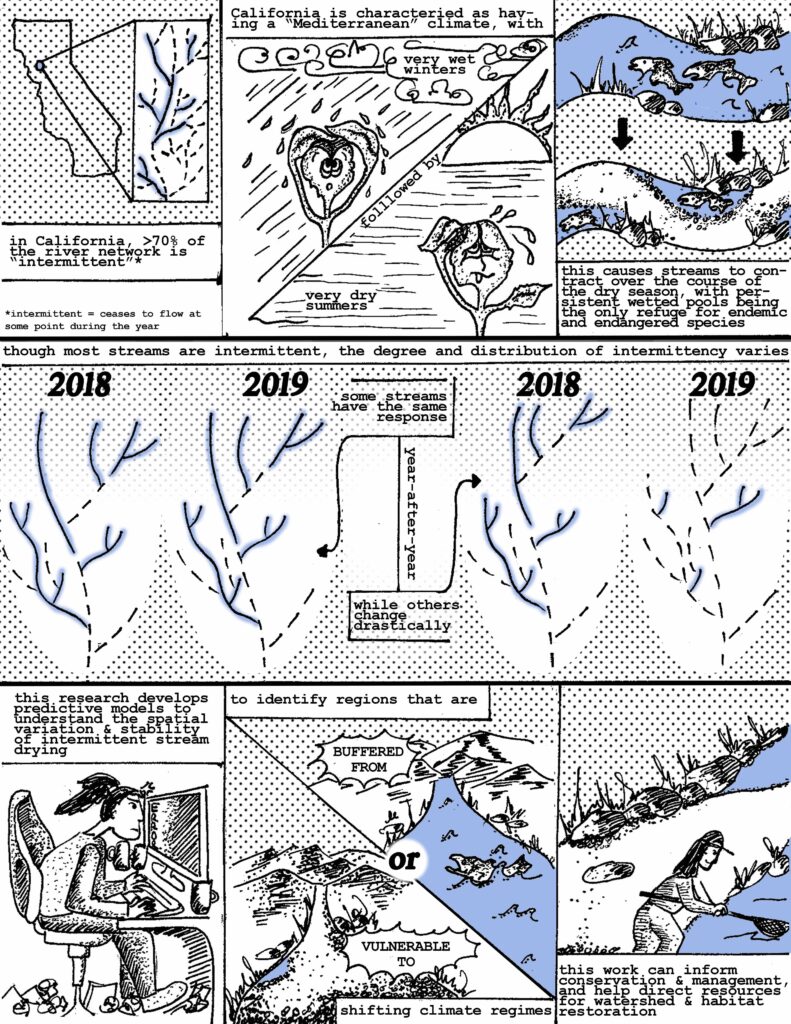In this opinion piece, published in Land Use Policy, we explore the barriers that cannabis cultivators face in complying with California’s cannabis regulations post-legalization.

In this opinion piece, published in Land Use Policy, we explore the barriers that cannabis cultivators face in complying with California’s cannabis regulations post-legalization.

A new paper from our research group, led by graduate student Brian Kastl, was recently published in Ecosphere, Migration in drought: Receding streams contract the seaward migration window of endangered salmon. The study explores how the migration of juvenile coho salmon from tributaries in the Russian River in springtime is affected by streamflow and temperature. We found that low seasonal streamflow and warm temperatures associated with drought resulted in an earlier and contracted migration of coho salmon smolts from the system. The research suggests that protecting environmental flows by limiting surface water diversions and reducing groundwater withdrawals could help expand the outmigration window for coho salmon smolts and mitigate the effects of drought in this system and in other salmon-bearing streams projected to experience more severe droughts under climate change.
The study was also covered in a story in the San Francisco Chronicle, “California drought poses more obstacles to young Russian River coho salmon.
Wildfires are an increasing threat to people’s lives, property and livelihoods, especially in rural California communities. Cannabis, one of California’s most lucrative commercial crops, may be at a higher risk of loss from wildfire because it is mostly confined to being grown in rural areas, according to our new article led by Chris Dillis and published in Ecosphere. Check out the paper and UC press release!
Postdoc researcher Denise Colombano gave a keynote talk at the 2022 Interagency Ecological Program (IEP) Workshop, titled “Strength in numbers: advancing estuarine ecology through data synthesis and collaboration”. She discussed successful research team culture, and provided insights from others through interview clips. Her talk was voted People’s Choice for Best Presentation—watch it on Youtube!
Melissa von Mayrhauser, Ph.D. student (now candidate!) in the Ruhi and Grantham labs, just passed her Ph.D. qualifying exam! Her prospectus is titled Changing Flows, Ecosystems, and Perceptions on the Los Angeles and Santa Clara Rivers, and we are really excited about all the cool research on urban stream ecosystem restoration that’s underway. Congratulations, Melissa!
PhD candidate Hana Moidu explores this question in her article on California WaterBlog and a recent paper published in Water Resources Research! And an amazing graphical summary of her study is provided here:

We recently published a series of papers in a Special Issue of Frontiers in Environmental Science focused on “Environmental Flows in an Uncertain Future.” Stein et al. (2022) provide an overview of the California Environmental Flows Framework (CEFF). Grantham et al. (2022) describe the modeling approach to predict functional flows in California streams and inform development of environmental flow recommendations under CEFF. And Yarnell et al. (2022) present case studies for how CEFF can be applied to groundwater-influenced stream ecosystems. More to come!
The paper Energy limitation or sensitive predators? Trophic and non-trophic impacts of wastewater pollution on stream food webs, led by Jordi-Rene Mor, visiting PhD student from Catalonia, was just published in Ecology. Take a look if you are interested in community size spectra!
We’re really thrilled to welcome Rose Mohammadi as a new Ph.D. student in the lab! Rose’s research will focus on how drought affects metacommunity stability, using time-series modeling and field experiments at Chalone Creek, Pinnacles National Park, in the context of our recent NSF CAREER. We extend our warmest welcome to Dr. Rodrigo Sinistro, who just joined the lab as a sabbatical for this upcoming academic year. Rodrigo is a freshwater ecologist from the University of Buenos Aires (Argentina), specialized in restoration of eutrophic water bodies, and is bringing some planktonic expertise to the salty side of our research program. Welcome, Rose and Rodrigo!
We just got funding from the California Department of Fish and Wildlife (Proposition 1 grant program) to assess how climate variability may be altering food-web dynamics in the San Francisco Bay-Delta via phenological mismatches! This is a collaboration with Prof. Stephanie Carlson (co-PI), involving partners at government agencies (USGS & CDFW) and leveraging cool time-series methods on a range of long-term monitoring data sets in the estuary. Postdocs Denise Colombano and Robert Fournier are doing the heavy-lifting. Stay tuned!